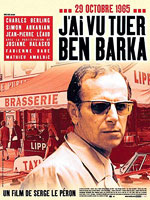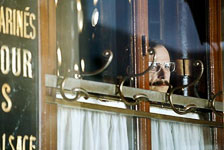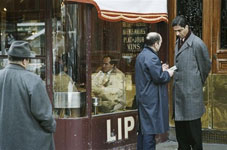|
en français
|
time schedule
| feature films |
short films
|
program
[PDF]
2009
Festival Feature Films (March 27-29)

French director Serge Le Péron and actress Josiane Balasko present Jai vu tuer Ben Barka
director Serge Le Péron with Saïd Smihi screenplay Serge Le Péron, Frédérique Moreau, Saïd Smihi starring Charles Berling, Simon Abkarian, Josiane Balasko running time 1 h 41 min general audience
Synopsis
January 1966. In a Paris apartment the police find the corpse of Georges Figon, the man who blew the whistle on the Ben Barka scandal that shook up the Gaullist government.
A year earlier … Figon, tired of dubious deals and petty scams, is on the hunt for a lucrative project. Connected to the underworld since his time in jail, he is put in charge of a substantial mission: to produce a documentary about decolonization, written by Marguerite Duras and directed by Georges Franju, assisted by the famous Moroccan militant leader, Mehdi Ben Barka, hired as the film’s historical adviser.
Unknown to most of those involved in the film’s production, the project is a trap.
director/screenwriter
Serge Le Péron
| 2008 |
Françoise Dolto, le désir de vivre |
| 2005 |
J’ai vu tuer Ben Barka |
| 2003 |
Chaplin Today: The Gold Rush |
| 2001 |
Léaud l’unique |
| 2000 |
L’Affaire Marcorelle |
| 1990 |
Sésame, ouvre-toi! |
| 1984 |
Laisse béton |
| 1976 |
L’Olivier |
actress
Josiane Balasko
For selected filmography see Cliente.
actor
Charles Berling
selected films since 1996
| 2008 |
L’Abolition by Jean-Daniel Verhaeghe |
| |
Par suite d'un arrêt de travail by Frédéric Andréi |
| |
L’Heure d’été by Olivier Assayas |
| |
Caos calmo by Antonio Luigi Grimaldi |
| 2007 |
Les Murs porteurs by Cyril Gelbat |
| 2006 |
Je pense à vous by Pascal Bonitzer |
| |
L’Homme de sa vie by Zabou Breitman |
| 2005 |
J’ai vu tuer Ben Barka by Serge Le Péron |
| |
La Maison de Nina by Richard Dembo |
| |
Grabuge! by Jean-Pierre Mocky |
| |
Un fil à la patte by Michel Deville |
| 2004 |
Agents secrets by Frédéric Schoendoerffer |
| 2003 |
Je reste! by Diane Kurys |
| |
Le Soleil assassiné by Abdelkrim Bahloul |
| |
Père et fils by Michel Boujenah |
| 2002 |
Jean Moulin by Yves Boisset |
| |
Cravate club by Frédéric Jardin |
| |
Demonlover by Olivier Assayas |
| |
Filles perdues, cheveux gras by Claude Duty |
| 2001 |
Comment j’ai tué mon père by Anne Fontaine |
| |
Un jeu d’enfants by Laurent Tuel |
| |
Les Âmes fortes by Raoul Ruiz |
| |
15 août by Patrick Alessandrin |
| |
Fils de zup by Gilles Romera |
| 2000 |
Comédie de l’innocence by Raoul Ruiz |
| |
Les Destinées sentimentales by Olivier Assayas |
| |
Stardom by Denys Arcand |
| |
Scènes de crimes by Frédéric Schoendoerffer |
| |
Une affaire de goût by Bernard Rapp |
| 1999 |
Fait d’hiver by Robert Enrico |
| |
Un pont entre deux rives by Frédéric Auburtin |
| 1998 |
L’Ennui by Cédric Kahn |
| |
L’Inconnu de Strasbourg by Valeria Sarmiento |
| |
Ceux qui m’aiment prendront le train by Patrice Chéreau |
| |
Un dimanche matin à Marseille: Renaud by Mario Fanfani |
| |
La Cloche |
| 1997 |
Nettoyage à sec by Anne Fontaine |
| |
Obsession by Peter Sehr |
| |
Les Palmes de M. Schutz by Claude Pinoteau |
| 1996 |
Love, etc. by Marion Vernoux |
| |
Ridicule by Patrice Leconte |
actor
Simon Abkarian
selected films since 1989
| 2009 |
Rage by Sally Potter |
| 2008 |
Le Chant des mariées by Karin Albou |
| |
Musée haut musée bas by Jean-Michel Ribes |
| |
Secret défense by Philippe Haïm |
| |
C’est dimanche! by Samir Guesmi |
| |
Khamsa by Karim Dridi |
| |
Shiva by Ronit Elkabetz and Shlomi Elkabetz |
| 2007 |
L’Affaire Ben Barka by Jean-Pierre Sinapi |
| |
Rendition by Gavin Hood |
| |
La Disparue de Deauville by Sophie Marceau |
| |
Casino Royale by Martin Campbell |
| |
Persépolis (voice) by Vincent Paronnaud and Marjane Satrapi |
| 2006 |
Le Serpent by Eric Barbier |
| |
Aurore, une autre histoire by Henri Kebabdjian |
| |
Hier encore by Rima Samman |
| |
Le Voyage en Arménie by Robert Guédiguian |
| |
Petites révélations by Marie Vermillard |
| 2005 |
S.A.C.: Des hommes dans l’ombre by Thomas Vincent |
| |
J’ai vu tuer Ben Barka by Serge Le Péron |
| |
Zaïna, cavalière de l’Atlas by Bourlem Guerdjou |
| |
Le Démon de midi by Marie-Pascale Osterrieth |
| |
Les Mâtines by Annick Raoul |
| |
Dans tes rêves by Denis Thybaud |
| |
Les mauvais joueurs by Frédéric Balekdjian |
| 2004 |
Ve’Lakhta Lehe Isha by Ronit Elkabetz and Shlomi Elkabetz |
| |
Yes by Sally Potter |
| 2003 |
La Légende de Parva by Jean Cubaud |
| 2002 |
Aram by Robert Kechichian |
| |
The Truth About Charlie by Jonathan Demme |
| |
Ni pour, ni contre (bien au contraire) by Cédric Klapisch |
| |
Un monde presque paisible by Michel Deville |
| |
Ararat by Atom Egoyan |
| 1999 |
Lila Lili by Marie Vermillard |
| 1997 |
J’irai au paradis car l’enfer est ici by Xavier Durringer |
| |
Le Silence de Rak by Christophe Loizillon |
| |
Tempête dans un verre d’eau by Arnold Barkus |
| 1996 |
Chacun cherche son chat by Cédric Klapisch |
| 1992 |
Rien du tout by Cédric Klapisch |
| 1991 |
Au fil de ma vie by Charlie Sansonetti |
| 1989 |
Ce qui me meut by Cédric Klapisch |
Interview with director Serge Le Péron
Why make this movie now?
Principally for political reasons. I think it is important to remember that period, the 1960s, in order to better understand our own time, the 21st century.  We are in a time now when the leaders of the Third World are taking a very strong anti-Western position. I think it’s important, therefore, to talk about a period when Third World leaders like Ben Barka, Lumumba, Allende, had a universal view of world development. One of the reasons for the current gap between North and South, between the Third World and the West, comes from the fact that we assassinated people like Lumumba, Ben Barka and Allende. The Ben Barka affair speaks of a time when there was this alliance, this deep friendship between Western intellectuals — those who wanted to change the Western world — and the intellectuals and leaders of the Third World. We are in a time now when the leaders of the Third World are taking a very strong anti-Western position. I think it’s important, therefore, to talk about a period when Third World leaders like Ben Barka, Lumumba, Allende, had a universal view of world development. One of the reasons for the current gap between North and South, between the Third World and the West, comes from the fact that we assassinated people like Lumumba, Ben Barka and Allende. The Ben Barka affair speaks of a time when there was this alliance, this deep friendship between Western intellectuals — those who wanted to change the Western world — and the intellectuals and leaders of the Third World.
During these past 40 years, one cannot say that much of the truth was known about the fate of Ben Barka. What is sure is that many things said at the time were untrue. But we know more now. Moroccan spies have talked. We know who was in Rabat at the time, in Paris, which secret service was in charge of the plot. We know, for instance, that the CIA was involved. In 1965, Ben Barka’s disappearance was considered as a Franco-Moroccan affair, but after all these years, we understand that it was more of a universal affair, that Mehdi Ben Barka was not killed only because he was against the ‘politique’ of Morocco at that time. Ben Barka was a leader of a Third World organization called the Tricontinental.
Were there problems in funding the film?
It was a little complicated at first in France to get the financing. Then, in fact, things became easier when Morocco came on board for the co-production of the film, as if the French institutions were reassured to see that the Moroccan regime of today was ready to examine at least part of the truth about the abduction of Mehdi Ben Barka.  The thing is that in France we have not talked much about this period of colonization and especially decolonization, in films, television or novels. ... There were very few films made about the Algerian War, about the war in Indochina, about all these movements of decolonization which happened in the 1950s and 1960s. That is why today there is an explosion, a return of the repressed. The things we have hidden throughout the years now have to come out. Just think of the recent success of Days of Glory, which tells the story of the Senegalese infantrymen, that is to say, the men who came from Algeria, Morocco and Western Africa to liberate France from the Nazis. We never spoke about them either before. The thing is that in France we have not talked much about this period of colonization and especially decolonization, in films, television or novels. ... There were very few films made about the Algerian War, about the war in Indochina, about all these movements of decolonization which happened in the 1950s and 1960s. That is why today there is an explosion, a return of the repressed. The things we have hidden throughout the years now have to come out. Just think of the recent success of Days of Glory, which tells the story of the Senegalese infantrymen, that is to say, the men who came from Algeria, Morocco and Western Africa to liberate France from the Nazis. We never spoke about them either before.
In France, my film was rather well received by critics on both right and left sides. I think that people liked the form I chose as well — the fact that it was a film which talked about political matters while using an accessible cinematic form: a “film noir,” a thriller. The actual facts of the Ben Barka affair were in themselves thrilling, so it wasn’t hard to reproduce them as a “film noir.” There is also the fact that the release happened in France at a period when we wanted to talk about decolonization. The film came out during the riots in France. I went to a lot of cinemas to present it to the audience and to talk about it. In these suburbs, which were burning, you could see the discussion was about what has happened between France and the countries from where all these kids in the suburbs and their parents come from. There was this desire to know more, because the history books at school tell them very little on the matter.
|

